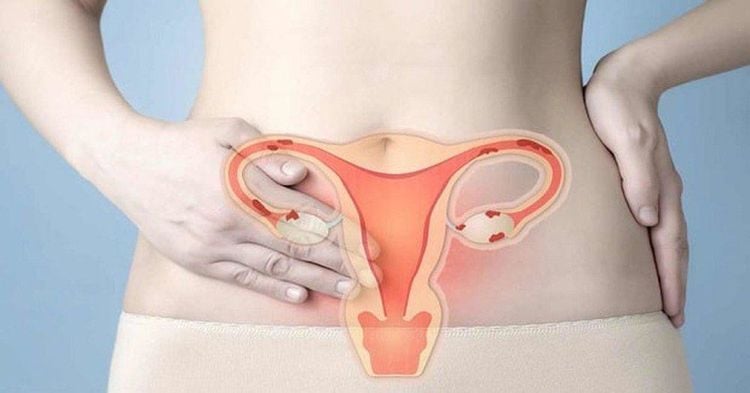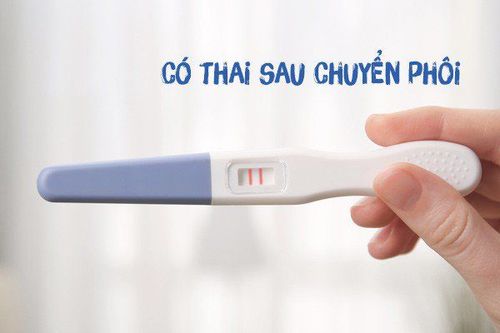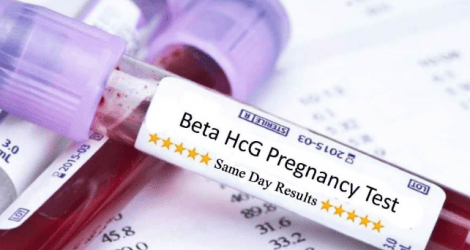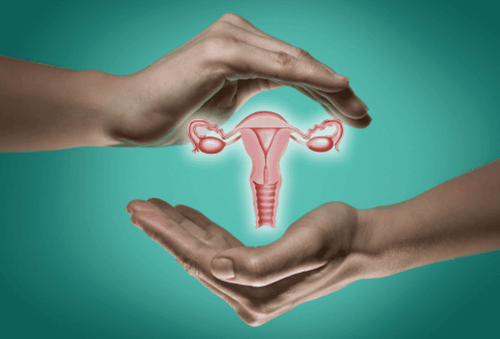This is an automatically translated article.
The uterine lining plays a very important role in the implantation of the fetus. When there is a good embryo but the uterine lining is not good, the embryo transfer to the uterus as well as the ability to implant the embryo will be poor. Therefore, monitoring the uterine lining is very important.1. What is the normal thickness of the uterine lining?
The lining of the uterus is a soft, spongy lining that covers the entire inner surface of the uterus. The growth of the lining of the uterus will depend mainly on the female hormone estrogen. Endometrial thickness frequently changes from childhood, through sexual maturity, during pregnancy and after menopause.According to research, the uterine lining is at its thinnest during menstruation, then usually about 2-4 mm thick, 3-4 mm after menstruation and in the middle of the menstrual cycle, close to ovulation. is 8-12 mm. The thickness of the lining of the uterus is very important to allow the embryo to implant successfully and receive all the necessary nutrients.
If the uterine lining is thinner than 7-8 mm, conception will become more difficult, the embryo cannot attach to the uterine cavity to implant. In case the fetus can implant and form a fetus, it is not able to provide enough nutrition to support the developing fetus because the uterine lining is too thin. The thin uterine lining can be caused by low estrogen levels in the female body, an unscientific lifestyle, diseases related to the uterus, anemia or repeated abortions...
If the uterine lining is more than 20mm thick, women often have amenorrhea, menorrhagia or polycystic ovary disease, ovulation disorder. These conditions will affect the ability to conceive.
Therefore, monitoring the mucosa for embryo transfer is very necessary, this is an easy ultrasound technique to perform at many medical facilities to help evaluate the uterine lining.

Niêm mạc tử cung là lớp niêm mạc mềm, xốp, niêm mạc tử cung sẽ bao phủ toàn bộ bề mặt phía trong của tử cung
2. How many days after mucosal monitoring for embryo transfer?
There are different methods to prepare the lining of the uterus during the embryo transfer cycle. However, "how long does mucosal monitoring take to transfer embryos?" is an important factor for successful conception for couples.For the case of stored embryo transfer, the time to monitor the mucosa for embryo transfer is about 12-18 days, starting from day 2 of the menstrual cycle and also depending on the body's response to the drug.
For embryo transfer to have a high success rate, the uterine lining of women must be at least 8mm, and at the same time meet the standards of appropriate shape, position, etc. However, 8-14mm thick mucosa is best for embryo transfer. Low or high is not suitable for embryo transfer.
In short, “how many days of mucosal monitoring before embryo transfer?” It depends on many factors, from which the treating doctor will make the best decision for embryo transfer.

Để chuyển phôi có tỷ lệ thành công cao, niêm mạc tử cung của chị em phụ nữ tối thiểu phải được 8mm
3. Notes for successful embryo transfer
For successful embryo transfer, women should note a few things to increase the chances of conception as well as a healthy pregnancy:Drink and order drugs as prescribed by your doctor: Before embryo transfer, sisters You should take your medicine, order it regularly and on time as prescribed by your doctor. Adequate nutrition: Before performing embryo transfer, the mother should have a healthy diet, especially foods that are good for the mucosa. Some foods that are good for the lining of the uterus such as: Soy milk, durian, avocado, unsaturated fats, omega 3, carp to help with pregnancy and stabilize pregnancy, eat dark green leafy vegetables like soups cauliflower, spinach, cabbage; beef, chicken eggs, blood cockle, brick crab... Avoid eating laksa leaves, longan, papaya, squid... and follow a healthy lifestyle, abstain from alcohol, beer, tobacco and other stimulant influences to mother and baby health. Drink plenty of water: Before embryo transfer, women should drink a lot of filtered water and soy milk to support their health. Besides, it is necessary to combine drinking juices such as watermelon, carrot, grapefruit or orange juice... to supplement vitamins as well as prevent constipation. In addition, do not take any medicine without the guidance or consent from the treating doctor, including tonic or traditional medicine. Exercise, exercise: If the uterus does not receive enough blood, it will not be able to make the uterine lining thick enough every month. Regular exercise and exercise every day will help keep the blood vessels that feed the uterus open, allowing more blood to flow to the reproductive organs. In addition, exercise also helps women keep the spirit of relaxation and reduce stress. Keep mentally and psychologically stable: During the IVF process, you should keep an optimistic and happy spirit. Avoid watching violent, agitated movies, family members also avoid actions that make a woman psychologically stressed, thereby affecting the hormones in the body and the embryo. Moderate activity: For infertile couples who cannot rest during the fertilization process, they should consider a moderate lifestyle, sleep at the right time, and avoid staying up late. Especially 1 day before embryo transfer, couples should not have sex because it may affect the outcome of embryo transfer.

Việc vận động cũng như tập thể thao điều độ mỗi ngày sẽ giúp giữ cho động mạch máu nuôi buồng tử cung mở, máu lưu thông đến cơ quan sinh sản được nhiều hơn
Advantages when customers choose Vinmec fertility center:
Equipped with modern equipment, clean air system according to international standards to ensure lab quality, single cabinet system to optimize quality embryo, improving the success rate for each cycle of artificial insemination. Implement most advanced assisted reproductive techniques in the world: ICSI (injection of sperm into the oocyte cytoplasm); support embryo escape membrane; Reproductive reserve: embryo freezing, sperm freezing, oocyte freezing to help customers take the initiative in giving birth at will, transferring embryos on day 5, minimizing pregnancy; male infertility techniques (PESA, MESA, TEFNA, TESE) Besides advanced reproductive support methods, a team of excellent doctors in the country and the world, with prestige and long-term experience in the field of infertility .
Please dial HOTLINE for more information or register for an appointment HERE. Download MyVinmec app to make appointments faster and to manage your bookings easily.













